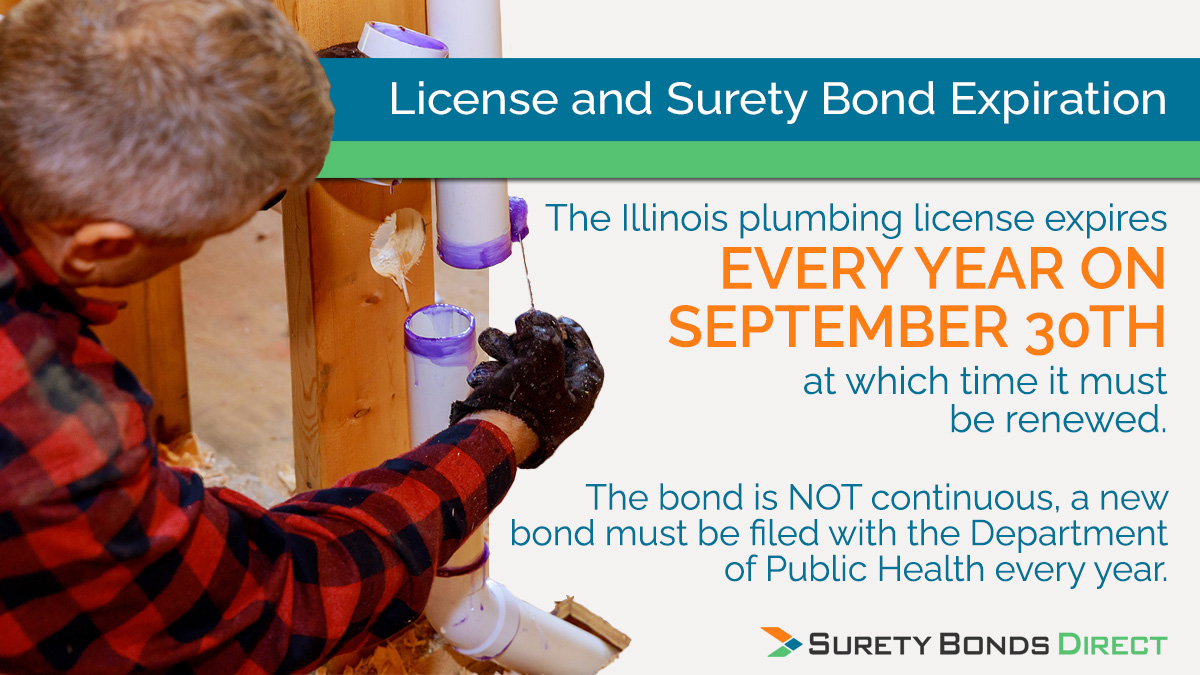There are only 4 major steps to get your Illinois plumbing license. The process is not complex, but it's rigorous. This short article will explain each step, but more importantly explain the application requirements that might be new to you.
Click on the step below to skip to that section of the article:
- Step 1 - Become an apprentice
- Step 2 - Complete the required education and pass the plumbing examination
- Step 3 - Complete the plumbing application and it's minimum legal requirements
4 Steps To Secure Your Illinois Plumbing License

Step 1: Become a Licensed Apprentice
There are only two requirements to obtaining a plumbing apprentice license:
- You must be at least 16 years of age
- You must provide proof of being sponsored by an Illinois licensed plumber or an approved apprenticeship program
While these steps are relatively simple, gaining the experience is challenging.
Illinois requires a minimum or 4 years and maximum of 6 years apprenticeship.
The minimum and maximum exist because once you pass the minimum of 4 years, you have the additional 2 years to take and pass the plumbing licensing exam.
If you don't take and/or don't pass the exam, you're not allowed to renew your apprenticeship license. Illinois requires you to pass the licensing exam, but you don't have to become a "fully" licensed plumber contractor. You can stay licensed as an apprentice.
Step 2: Pass The Plumbing Exam

In order to qualify to take the plumbing exam, you must have:
- The minimum of 4 years of apprenticeship
- At least 2 years of high school or education equivalent completed
- Complete an approved course through a college, university or trade school
Once you meet all of these requirements, you can apply to take the exam. The application must be completed at least 30 days before your official exam date.
The exam (currently) is 3 hours long requiring a score of 70 or higher to pass. There are no calculators or reference materials allowed during the examination.
Among other topics, expect the following topics to be covered:
- Plumbing theory and plumbing in practice
- Safety requirements
- Different types of plumbing systems
- Creating and use plumbing drawings and plans
- Cutting and assembling systems
- Maintenance and repair of all systems
If you fail, you must reapply with a re-examination form and $175 exam fee.
Step 3: Outline the Business Structure
The application is straight forward, however if this is your first time getting licensed or obtaining an occupational license, many of these requirements will be new to you.
You need to provide the business structure and personal information for the owner and/or owners.
The primary and overarching business structures are:
- Sole proprietor
- Partnership
- Corporation or Limited Liability Company (LLC)
If you're a corporation getting licensed for the first time, you must submit a copy of the Articles of Incorporation from the Secretary of State.
If the business entity is a LLC getting licensed for the first time, you must submit a copy of the Articles of Organization and the meeting minutes showing all registered members.
For both corporations and LLCs, one or the owners or members must be the licensed plumbing contractor.
If the business entity is a partnership, one of the partners must be a licensed plumber.
Finally, if you represent a business entity from another state seeking licensure in Illinois, you need to submit a copy of the Authority to Transact Business in Illinois. This can be found and filed with the Secretary of State.
The individual who is the licensed plumber (licensed plumber of record) can only be the license plumber for this business entity. They are not allowed to serve as a licensed plumber for more than one business entity.
Step 4 - Fulfill the Insurance Requirements
There are three different types of insurance, two of which are required to purchase, and each policy must remain valid at all times:
- Liability insurance
- Workers compensation
- Surety bond
Liability Insurance
The minimum requirements for liability insurance are:
- $100,000 general liability
- $300,00 bodily injury
- $50,000 property damage
- $500,000 workers compensation
These are the minimum requirements for coverage and will probably change based on your specific business needs.
If you don't have employees, you're not required to purchase workers compensation insurance, but must submit a copy of a:
- Affidavit of No Employees
- Opt-Out form
Surety Bond

A surety bond, in this case usually referred to as a contractor license bond, is required in the amount of $20,000.
If this is your first time getting licensed, you may have never heard of a surety bond before.
A surety bond is a type of insurance you purchase to act as a guarantee that you will:
- Follow all building and plumbing codes in Illinois
- Service your customers with good business practices and ethics
- Complete all projects in full and according to the contracts you sign
What makes a surety bond different is the fact the bond is coverage for the customers of a plumber in the event of:
- Not starting a project or completing a project
- Breaking a contract agreement for services
- Performing subpar work on purpose to save money
- Using materials or parts not outlined in the contractor
- Not paying any apprenticed plumber or licensed plumber working for you
If a plumber is found guilty of these or similar acts, the customer can make a claim against the plumber for financial compensation, but only up to the $20,000 bond amount.
How Much Does a Surety Bond Cost?

Again, the required surety bond must have coverage in the amount of $20,000. This is a set amount, no less, no more.
The price is typically quoted by a surety, an insurance company that underwrites surety bonds.
But if you want to save money and make the process easier, use a specialized surety agency like Surety Bonds Direct.
Surety Bonds Direct works with a network of A rated sureties, allowing us to find the lowest possible price for your Illinois plumber contractor bond.
You can purchase an Illinois plumber bond for a low fixed price of $100 with no credit check.
| Bond Type | Bond Amount | Pricing | Get Started |
|---|---|---|---|
| Illinois Plumbing Contractor | $20,000 | $100 | Purchase Right Now |
What About a Line of Credit
You'll notice on the application, another option is providing a line of credit. For most businesses, this is a cost prohibitive option.
To satisfy a line or credit (again, in most cases() you'll be required to deposit the fully $20,000 in a bank account.
Compare this to the contractor surety bond where you only need to pay $100 per year and you can quickly see the benefit of choosing to purchase a surety bond.
License and Surety Bond Expiration

The Illinois plumbing license expires every year on September 30th at which time it must be renewed.
The Illinois Department of Public Health requires the plumbing surety bond to expire with the license on September 30th.
Renewing your license requires completing an online license renewal application and paying the yearly $150 fee.
Renewing your surety bond is very similar. If you work with Surety Bonds Direct, we manage this process for you. **You only need to pay the renewal premium of $10088 and we'll prepare your bond with the correct form and signatures.
Illinois requires a new bond to be filed each year. We are allowed to email you a copy of the bond and you can use this to file with the Department of Public Health.
Surety Bonds Direct Is Ready To Help You Purchase Your Bond
I hope this article helped you understand the application process.
It's not a complex application process as long as you have all of the information, experience, and insurance forms ready.
We will help you purchase your contractor plumbing bond when you're ready. It's only $100 and we can have it prepared and issued to you within one business day.
If you have any questions about the bond process or you prefer to talk with a bond specialist, call 1-800-608-9950 today.






